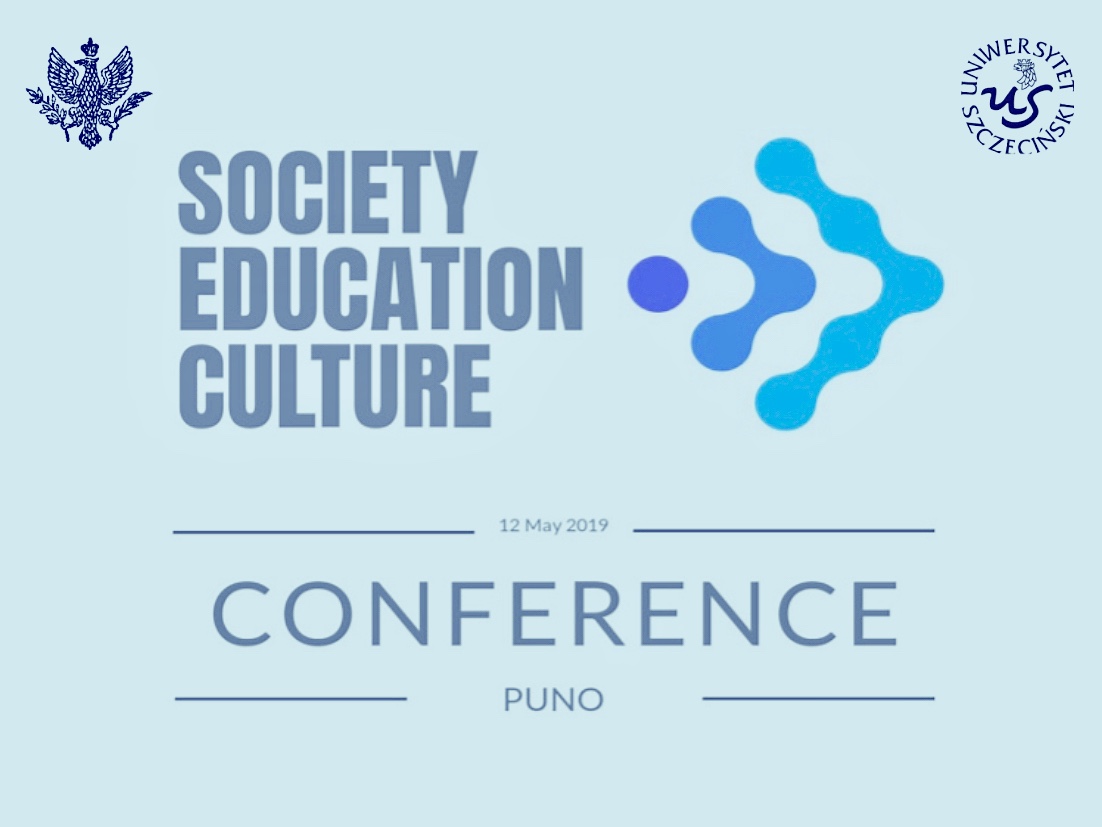Event
SOCIETY, EDUCATION, CULTURE
Polish University Abroad and Institute of Pedagogy, University of Szczecin invite to London, on 12th May 2019, to the international conference. The purpose of the conference is to develop a platform for interdisciplinary discussion on the recognition and understanding of human activities in the dynamically developing world of science, education and culture, initiated with PhD seminar meetings at Polish University Abroad in London.

Issues related to human activities in many areas of social life can be defined by conflicts arising between what belongs to a group and what is private, relating to the individual. On the one hand, we co-exist and we are affected by mutual relations that we accept as something essential. On the other hand, we are creating internal “wall”, strongly influenced by the social context, even if it could mean some kind of alienation. We acquire the dichotomous way of social life via learning processes. But we also pass it on to others, through social interactions, which increases interest in looking for value of life. Social sciences directly raise questions about phenomenon, processes, structure and order, strength, changes and the transformation of the relation between humans. Those sciences are looking for an answer to the question: “Why it happens?”, “What can we do with it?”
Scientific insight and research regarding the reality makes sense only if it serves to human beings. This way all the intentions and results of research efforts should be continuously assessed. One of the best opportunities for it are – among others – scientific conferences and seminars. They enable the development of scientific and practical discourse through the descriptions, analysis, interpretations and implementation of cognition effects.
Scientific Committee of the Conference:
Prof. Elżbieta Perzycka, University of Szczecin, Poland
Prof. Aaliya Ahmed, University of Kashmir, India
Prof. Erik Bartland, Nord University, Norway
Prof. Eunika Baron – Polańczyk, University of Zielona Góra, Poland
Prof. Maria Czerepaniak-Walczak, University of Szczecin, Poland
Dr Grażyna Czubińska, The Polish University Abroad, United Kingdom
Prof. Rosita Deluigi – University of Macerata, Italy
Prof. Nitul Dutta, Marwadi Education Foundation Group of Institutions,India
Prof. Tatyana Grebenyuk, The Immanuel Baltic Kant Federal University, Russia
Dr Aleksandra Łukaszewicz Alcaraz, Academy of Art in Szczecin, Poland
Dr Lidia Marek, University of Szczecin, Poland
Prof. Jarosław Janio, Santa Anna Collage, United States of America
Prof. Svetlana Konyushenko, The Immanuel Baltic Kant Federal University, Russia
Prof. Alla Matuszak, Chelyabinsk State Pedagogical University, Russia
Prof. John Ndiritu, Kenyatta University, Kenya
Prof. Oleksandr Kundytsky, Ivan Franko National University of Lviv, Ukraine
Prof. Stefano Polenta, University of Macerata, Italy
Prof. Parween A. Pandit, Central University of Kashmir, India
Prof. Anita Romanová, University of Economics in Bratislava, Slovakia
Prof. Pier Giuseppe Rossi, University of Macerata, Italy
Prof. Mohmad Saleem Jahangir, University of Kashmir, India
Prof. Aneesa Shafi, University of Kashmir, India
Prof. Flavia Stara, University of Macerata, Italy
Prof. Božena Šupšáková, Comenius University, Slovakia
Prof. Raffaelo Tumino, University of Macerata, Italy
Prof. Francis Wokabi, Pwani University in Kilifi Kenya, Kenya
Dr Anna Watoła, University Silesia, Poland
Prof. Anna Zembala, Katholische Hochschule Nordrhein-Westfalen, German
Organising Committee of the Conference:
Dr Aleksander Cywiński, University of Szczecin, Poland
Mgr Adriana Górka, The Polish University Abroad, United Kingdom
Mgr Katarzyna Karita, The Polish University Abroad, United Kingdom
Mgr Leszek Kulaszewicz, The Polish University Abroad, United Kingdom
Mgr Sandra Malinowska, University of Szczecin, Poland
Mgr Ilona Mościcka, The Polish University Abroad, United Kingdom
Mgr Anna Rosiak, University of Szczecin, Poland
Mgr Piotr Surmaczyński, The Polish University Abroad, United Kingdom
Mgr Urszula Walczak, The Polish University Abroad, United Kingdom
Mgr Aldona Wojtecka, The Polish University Abroad, United Kingdom
Contact: Polish University Abroad, 240 King Street, London W6 0RF
Email: naukowe@puno.edu.pl
Information
Cultural anthropologist specialising in literary studies, art critic; head of the Research Centre on the Legacy of Polish Migration in London
See also
Artificial Intelligence in Sciences and Arts. Chances and dangers
We invite experienced researchers and PhD students to apply to participate in PUNO’s V International Interdisciplinary Academic Conference. This event aims to unite young researchers worldwide to explore and discuss AI’s educational opportunities and challenges. Participants can present a paper or a poster showcasing their research and findings related to the conference theme. We encourage you to submit your abstract for consideration.
Fourth International Communication Styles Conference
Communication Styles conference is the fourth in the series of biannual conferences which were initiated in 2013 and took place in Krosno in Poland. So far the conferences have a publication record with a collection of articles entitled Culture’s Software: Communication Styles (Cambridge Scholars 2015), a special issue of the Styles of Communication journal (9:1; 2017) and an issue of Tertium Linguistic Journal (3.1; 2018).
Human Beings and the Challenges of the Contemporary World
Citlali Rovirosa-Madrazo, in Living on Borrowed Time (2010), argued that“an opportunity to consider and change our situation, to try to understand the path that has led us here, and to think about what we can do to change the direction in which we are going. A crisis can open-up a genuine opportunity for us to gain ‘new knowledge’ and to chart new frontiers of cognition with real consequences for the course of future inquiry and discussion.” Today, after another global meltdown, there are new challenges but also opportunities to formulate the world. It is worth looking at the statements of academic researchers, writers, artists, creators of culture. We invite sociologists, psychologists, epidemiologists, historians, managers, literary and cultural scholars to join the discussion. The rich conference programme is available in the attachment.
"Native Language in the XXI Century - System, Education, Perspectives" (in Memory of Professor Michał Jaworski)
The Institute of Linguistics and Literary Studies at Jan Kochanowski University in Kielce invites you to participate in a scientific conference on the status and role of the native language in the modern world (with particular emphasis on the Polish language).